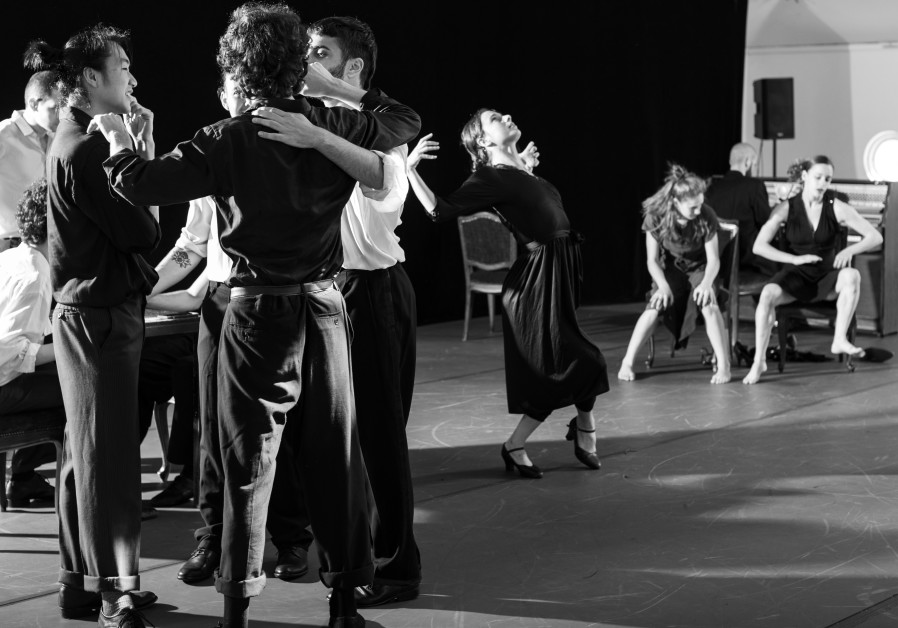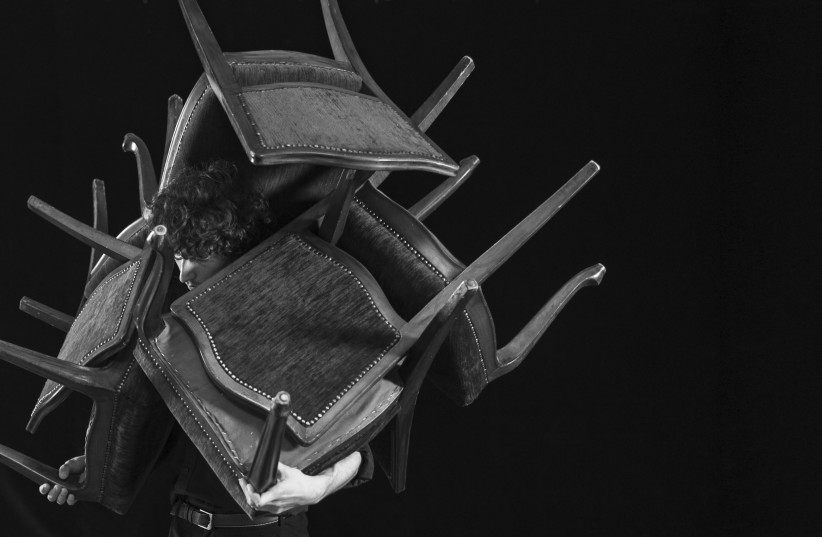
Once, when a woman was impassioned, people would say she had flushed crimson.
The definition of this antiquated expression is “to blush, to glow, to shine” yet the words perfectly capture the feeling created on stage in Bobbi Jene Smith and Or Schraiber’s new piece for the Batsheva Ensemble, Fugue in Crimson, which will premiere this weekend.
Set on a shallow stage and accompanied by the masterful pianist Yonatan Daskal, the choreography gets the blood going, both on and off stage. There is a sense of constant movement, of short yet intense interactions playing one into the other, of rhythm, song, text, fluidity and physicality all melding together.
Smith and Schraiber spent a significant period as dancers in Batsheva Dance Company. Many will recognize Smith, if not from her many appearances on stage, from Elvira Lind’s documentary Bobbi Jene, which tracked Smith’s departure from the company for New York City and premiered at the Tribeca Film Festival in 2017. Schraiber spent seven years with Batsheva, performing unforgettable roles in many of Ohad Naharin’s pieces, most notably the sublime opening moment of Last Work. After leaving the company, he moved to New York to pursue an acting career and has since performed in stage and screen productions. Smith and Schraiber are two of the stars in Boaz Yakin’s film AVIVA.
To make Fugue in Crimson, Smith and Schraiber, who are work and life partners, as well as new parents, arrived in Israel in January. Though the process may seem short to outsiders, the two artists expressed gratitude at having so much time to explore in the studio prior to the premier.

“It’s the longest process we have had,” said Schraiber.
Returning to Batsheva to make this work, the two artists were able to deeply connect with the dancers over the weeks they spent together, trying out ideas and developing themes.
“We’ve been following the breadcrumbs with this work,” said Smith during a press conference in Batsheva’s Studio Suzy. Nine of the Ensemble cast members had just finished performing three sections from the work and were sitting propped against the studio’s white walls. Smith and Schraiber joined Daskal, seated on stage left at his piano, to discuss the process.
“We thought about a fugue, being based on repetition, on themes that interweave. And to be in a state of fugue is to be lost. The dancers are lost in a state of passion,” Smith explained.
Schraiber added that the process was a true collaboration with the dancers, who are divided into two casts for Fugue in Crimson. “We made this work with the dancers, they contributed immensely. The piece is about the connection between the people and the journey they take together.”
The music for the work was composed and is played live by Daskal alongside several recorded classical segments, such as Bach’s “Partita No. 2 in C Minor” and Bizet’s “Mi Par D’udir Ancora” performed by Enrico Caruso. Daskal’s presence in the work breaks from the norm. Whereas, we are used to seeing musicians as a separate entity, in Fugue in Crimson, Daskal is an active player. The dancers approach him, touch him, speak to him and sing along with the notes he plays. He keeps a constant watch on the stage via a small antique mirror propped atop his piano. His presence points at an important notion in this work, there is no divide between the music and the body.
The costumes of the piece elicit nostalgia and elegance. “They are wearing very simple black and white clothes. They look like passed down garments from an old theater company,” said Smith.
There is an intentional blurring of lines between backstage and the stage in Fugue in Crimson, two spaces divided by a lush red curtain. At certain points, a high-heeled clad foot peeks out from under the carpet, furniture pieces are plucked from behind and flung onto the stage, and dancers stream out and are sucked back in.
“So much of our experiences as performers were from being backstage, waiting for something to happen,” said Smith. ■
Fugue in Crimson will be performed on March 18-23 at the Suzanne Dellal Center. For more information, visit: www.batsheva.co.il.






